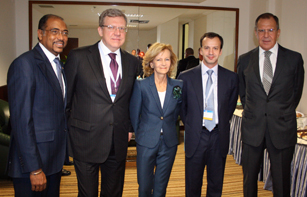
Panelists at the opening of the MDG-6 Forum including (left to right): Michel Sidibé, UNAIDS Executive Director; Alexey Kudrin, Governor of the World Bank Group and the IMF for the Russian Federation; Elena Salgado, First Vice President, Government of Spain; Arkady Dvorkovich, Aide to the President of the Russian Federation and Chair of the MDG-6 Forum; Sergey Lavrov, Minister of Foreign Affairs, Russian Federation.
On the opening day of the International Forum on MDG-6 in Eastern Europe and Central Asia, the three international Co-chairs of the meeting—UNAIDS, World Bank, and the Global Fund to Fight AIDS, Tuberculosis and Malaria—unveiled a new joint statement calling for accelerated action on MDG-6 in the region.
The three-day meeting in Moscow, hosted by the Government of the Russian Federation, brought together high-level representatives from government, civil society, the private sector and scientific community. The Forum is an unprecedented platform to redouble progress towards the sixth Millennium Development Goal (MDG) in the region.
MDG-6—one of eight development goals adopted by world leaders in 2000—calls for halting and reversing the spread of HIV, malaria, tuberculosis and other diseases by 2015. While the countries of Eastern Europe and Central Asia are on track to reach several of the MDGs, progress on MDG-6 is generally seen as behind.
Speaking at opening plenary on 10 October, Arkady Dvorkovich, Aide to the President of the Russian Federation and Chair of the MDG-6 Forum, underscored the critical link between achieving MDG-6, economic growth and sustainable development. “Russia has always considered fighting infectious diseases to be a priority for development. In view of the current economic situation, it has never been more important to ensure that our results are sustained and that commitments are kept,” he said.
Sergey Lavrov, Russia’s Minister of Foreign Affairs said that Russia’s development assistance strategy in the region includes programmes related to HIV and other infectious diseases. “The health of all people in all times has been the most important asset for any state—that is why our work on HIV is so important,” he said.
Since the G8 Summit in St Petersburg in 2006, Eastern Europe and Central Asia has made significant progress in its response to HIV—one of the main pillars of MDG-6. Across the region, more than 90% of pregnant women living with HIV now receive services to prevent new HIV infections in their children.
Access to antiretroviral therapy has also expanded rapidly. In the Russian Federation, nearly
80 000 people were receiving life-saving antiretroviral therapy in 2010, compared to just 5,000 people in 2005—a sixteen-fold increase.
Experience and science have shown us that without a holistic approach to the HIV response—including harm reduction and substitution therapy—we will not stop the transmission of HIV
UNAIDS Executive Director Michel Sidibé
Despite progress, Eastern Europe and Central has the fastest-growing epidemic in the world. Over the past decade, the number of people living with HIV in the region has nearly tripled, from 530 000 in 2000 to 1.4 million in 2009. Approximately half of all new HIV infections in the region result from injecting drug use.
“Experience and science have shown us that without a holistic approach to the HIV response—including harm reduction and substitution therapy—we will not stop the transmission of HIV,” said UNAIDS Executive Director Michel Sidibé, in his opening address at the Forum. “Inaction will be very costly—if we don’t pay now, we will pay forever.”
Elena Salgado, First Vice President of Spain, also underscored the importance of harm reduction programmes in preventing HIV transmission among people who use drugs. In recent years, Spain has adopted a pragmatic—rather than moral—approach to injecting drug use which has led to a steep decline in new HIV infections, she said.
A new MDG-6 Action Plan will be launched on the final day of Forum, with an emphasis on financing and regional partnerships. The plan provides a road map to achieve a 50% reduction in new HIV infections across the region, among other goals.




